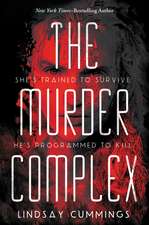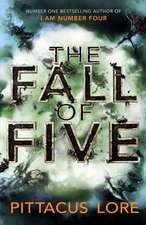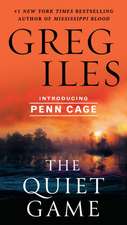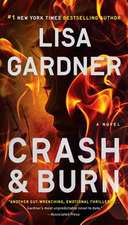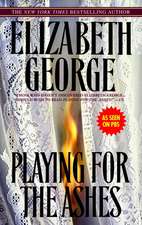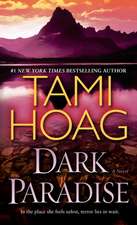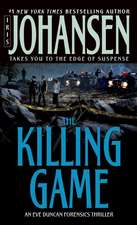Alone: Detective D.D. Warren Novels
Autor Lisa Gardneren Limba Engleză Paperback – 30 noi 2005
Alone . . . that’s where the nightmare began for cool, beautiful, and dangerously sexy Catherine Rose Gagnon. Twenty-five years ago, she was buried underground during a month-long nightmare of abduction and abuse. Now her husband has just been killed. Her father-in-law, the powerful Judge Gagnon, blames Catherine for his son’s death . . . and for the series of unexplained illnesses that have sent her own young son repeatedly to the hospital.
Alone . . . a madman survived solitary confinement in a maximum security prison where he’d done hard time for the most sadistic of crimes. Now he walks the streets a free man, invisible, anonymous . . . and filled with an unquenchable rage for vengeance. What brings them together is a moment of violence—but what connects them is a passion far deeper and much more dangerous. For a killer is loose who’s woven such an intricate web of evil that no one is above suspicion, no one is beyond harm, and no one will see death coming until it has them cornered, helpless, and alone.
From the Hardcover edition.
Preț: 57.90 lei
Nou
Puncte Express: 87
Preț estimativ în valută:
11.08€ • 11.53$ • 9.15£
11.08€ • 11.53$ • 9.15£
Carte disponibilă
Livrare economică 24 martie-07 aprilie
Preluare comenzi: 021 569.72.76
Specificații
ISBN-13: 9780553584530
ISBN-10: 0553584537
Pagini: 451
Dimensiuni: 109 x 174 x 25 mm
Greutate: 0.23 kg
Editura: Bantam Books
Seria Detective D.D. Warren Novels
ISBN-10: 0553584537
Pagini: 451
Dimensiuni: 109 x 174 x 25 mm
Greutate: 0.23 kg
Editura: Bantam Books
Seria Detective D.D. Warren Novels
Recenzii
"Three-dimensional characters fill out a riveting story that is like a juicy steak: slow broiled to perfection.... Highly recommended."
—Library Journal
"Intricate and suspenseful, ALONE keeps you on the edge of your seat."
—Los Angeles Times
"Like all the best suspense novels, ALONE will leave you shaken.... you can't wait to see what happens next."
—People Magazine
From the Hardcover edition.
—Library Journal
"Intricate and suspenseful, ALONE keeps you on the edge of your seat."
—Los Angeles Times
"Like all the best suspense novels, ALONE will leave you shaken.... you can't wait to see what happens next."
—People Magazine
From the Hardcover edition.
Notă biografică
Lisa Gardner is the New York Times bestselling author of The Neighbor, Say Goodbye, Hide, Gone, Alone, The Killing Hour, The Survivors Club, The Next Accident, The Other Daughter, The Third Victim, and The Perfect Husband. She lives with her family in New England, where she is at work on her next suspense novel, Live to Tell, which Bantam will publish Summer 2010.
Extras
Chapter One
He'd put in a fifteen-hour shift the night the call came in. Too many impatient drivers on 93, leading to too much crash, bang, boom. City was like that this time of year. The trees were bare, night coming on quick and the holidays looming. It felt raw outside. After the easy camaraderie of summer barbecues, you now walked alone through city streets hearing nothing but the skeletal rattle of dry leaves skittering across cold pavement.
Lots of cops complained about the short, gray days of February, but personally, Bobby Dodge had never cared for November. Today did nothing to change his mind.
His shift started with a minor fender bender, followed by two more rear-enders from northbound gawkers. Four hours of paperwork later, he thought he'd gotten through the worst of it. Then, in early afternoon, when traffic should've been a breeze even on the notoriously jam-packed 93, came a five-car pile-up as a speeding taxi driver tried to change four lanes at once and a stressed-out ad exec in a Hummer forcefully cut him off. The Hummer took the hit like a heavyweight champ; the rusted-out cab went down for the count and took out three other cars with it. Bobby got to call four wreckers, then diagram the accident, and then arrest the ad exec when it became clear the man had mixed in a few martinis with his power lunch.
Pinching a man for driving under the influence meant more paperwork, a trip to the South Boston barracks (now in the middle of rush-hour traffic, when no one respected anyone's right-of-way, not even a trooper's), and another altercation with the rich ad exec when he balked at entering the holding cell.
The ad exec had a good fifty pounds on Bobby. Like a lot of guys confronted by a smaller opponent, he confused superior weight with superior strength and ignored the warning signs telling him otherwise. The man grabbed the doorjamb with his right hand. He swung his lumbering body backwards, expecting to bowl over his smaller escort and what? Make a run for it through a police barracks swarming with armed troopers? Bobby ducked left, stuck out his foot, and watched the overweight executive slam to the floor. The man landed with an impressive crash and a few troopers paused long enough to clap their hands at the free show.
"I'm going to fucking sue!" the drunken exec screamed. "I'm going to sue you, your commanding officer, and the whole fucking state of Massachusetts. I'll own this joint. You hear me? I'll fucking own your ass!"
Bobby jerked the big guy to his feet. Ad Exec screamed a fresh round of obscenities, possibly because of the way Bobby was pinching the man's thumb. Bobby shoved the man into the holding cell and slammed the door.
"If you're gonna puke, please use the toilet," Bobby informed him, because by now the man had turned a little green. Ad Exec flipped him off. Then he doubled over and vomited on the floor.
Bobby shook his head. "Rich prick," he muttered.
Some days were like that, particularly in November.
Now it was shortly after ten p.m. Ad Exec had been bailed out by his overpriced lawyer, the holding cell was washed down, and Bobby's shift, which had started at seven a.m., was finally done. He should go home. Give Susan a buzz. Catch some sleep before his alarm went off at five and the whole joyous process started once more.
Instead, he was jittery in a way that surprised him. Too much adrenaline buzzing in his veins, when he was a man best known for being cool, calm, and collected.
Bobby didn't go home. Instead, he traded in his blues for jeans and a flannel shirt, then headed for the local bar.
At the Boston Beer Garden, fourteen other guys were sitting around the rectangular-shaped bar, smoking cigarettes and nursing draft beer while zoning out in front of plasma-screen TVs. Bobby nodded to a few familiar faces, waved his hand at the bartender, Carl, then took an empty seat a bit down from the rest. Carrie brought him his usual order of nachos. Carl hand-delivered his Coke.
"Long day, Bobby?"
"Same old, same old."
"Susan coming in?"
"Practice night."
"Aye, the concert. Two weeks, right?" Carl shook his head. "Beautiful and talented. I'll tell you again, Bobby--she's a keeper."
"Don't let Martha hear you," Bobby told him. "After watching your wife haul a keg, I don't want to think of what she could do with a rolling pin."
"My Martha's also a keeper," Carl assured him. "Mostly 'cause I fear for my life."
Carl left Bobby alone with his Coke and nachos. Overhead, a live news bulletin was reporting on some kind of situation in Revere. A heavily armed suspect had barricaded himself in his home after taking potshots at his neighbors. Now, Boston PD had deployed their SWAT team, and "nobody was taking any chances."
Yeah, November was a funny kind of month. Wired people up, left them with no defenses against the oncoming gloom of winter. Left even guys like Bobby doing all they could do just to hold course.
He finished his nachos. He drank his Coke. He settled his bill, and just as he convinced himself it really was a good idea to go home, the beeper suddenly activated on his belt. He read the screen one moment and was bolting out the door the next.
It had been that kind of day. Now it would be that kind of night.
Catherine Rose Gagnon didn't like November much either, though for her, the real problem had started in October. October 22, 1980, to be exact. The air had been warm, the sun a hot kiss on her face as she walked home from school. She'd been carrying her books in her arms and wearing her favorite back-to-school outfit: knee-high brown socks, a dark brown corduroy skirt, and a long-sleeved gold top.
A car came up behind her. At first, she didn't notice, but dimly she became aware of the blue Chevy slowing to a crawl beside her. A guy's voice. Hey, honey. Can you help me for a sec? I'm looking for a lost dog.
Later, there was pain and blood and muffled cries of protest. Her tears streaking down her cheeks. Her teeth biting her lower lip.
Then there was darkness and her tiny, hollow cry, "Is anyone out there?"
And then, for the longest time, there was nothing.
They told her it lasted twenty-eight days. Catherine had no way of knowing. There was no time in the dark, just a loneliness that went on without end. There was cold and there was silence, and there were the times when he returned. But at least that was something. It was the sheer nothingness, endless streams of nothingness, that could drive a person insane.
Hunters found her. November 18. They noticed the plywood cover, poked it with their rifles, and were startled to hear her faint cry. They rescued her triumphantly, uncovering her four-by-six earthen prison and releasing her into the crisp fall air. Later she saw newspaper photos. Her dark blue eyes enormous, her head skull-like, her body thin and curled up on itself, like a small brown bat that had been yanked harshly into the sun.
The papers dubbed Catherine the Thanksgiving Miracle. Her parents took her home. Neighbors and family paraded through the front door with exclamations of "Oh, thank heavens!" and "Just in time for the holidays" and "Oh, can you really believe . . . ?"
Catherine sat and let people talk around her. She slipped food from the overflowing trays and stored it in her pockets. Her head was down, her shoulders hunched around her ears. She was still the little bat and for reasons she couldn't explain, she was overwhelmed by the light.
More police came. She told them of the man, of the car. They showed her pictures. She pointed at one. Later, days, weeks--did it really matter?--she came to the police station, stared at a lineup, and solemnly pointed her finger once again.
Richard Umbrio went on trial six months later. And three weeks into that, Catherine took the stand with her plain blue dress and polished Mary Janes. She pointed her finger one last time. Richard Umbrio went away for life.
And Catherine Rose returned home with her family.
She didn't eat much. She liked to take the food and slip it in her pocket, or simply hold it in the palm of her hand. She didn't sleep much. She lay in the dark, her blind bat eyes seeking something she couldn't name. Often, she held quite still to see if she could breathe without making a sound.
Sometimes her mother stood in the doorway, her pale white hands fluttering anxiously at her collarbone. Eventually, Catherine would hear her father down the hall. Come to bed, Louise. She'll call if she needs you.
But Catherine never called.
Years passed. Catherine grew up, straightening her shoulders, growing out her hair, and discovering that she possessed the kind of dark, potent beauty that stopped men in their tracks. She was all pale white skin, glossy black hair, and oversized navy eyes. Men wanted her desperately. So she used them indiscriminately. It wasn't her fault. It wasn't their fault. She simply never felt a thing.
Her mother died. 1994. Cancer. Catherine stood at the funeral and tried to cry. Her body had no moisture, and her sobs sounded papery and insincere.
She went home to her barren apartment and tried not to think of it again, though sometimes, out of the blue, she would picture her mother standing in the doorway of her room. "Come to bed, Louise. She'll call if she needs you."
"Hey, honey . . . I'm looking for a lost dog. . . ."
November 1998. The Thanksgiving Miracle curled up naked in her white ceramic tub, her thin, bony body trembling from the cold as she clutched a single razor in her fist. Something bad was going to happen. A darkness beyond darkness. A buried box from which there would be no coming back.
"Come to bed, Louise. She'll call if she needs you."
"Hey, honey . . . I'm looking for a lost dog?"
The blade, so slender and light in her hands. The feel of its edge, kissing her wrist. The abstract sensation of warm, red blood, lining her skin.
The phone rang. Catherine roused herself from her lethargy long enough to answer it. And that single call saved her life. The Thanksgiving Miracle rose again.
She thought about it now. As the TV blared in the background: An armed suspect has barricaded himself in his home after taking numerous shots at his neighbors. Boston SWAT officials consider the situation highly volatile and extremely dangerous.
As her son sobbed in her arms. "Mommy, Mommy, Mommy."
And as her husband bellowed from below: "I know what you're doing, Cat! How stupid do you think I am? Well, it's not going to work. There's no way in hell you're going to get away with it! Not this time!"
Jimmy stormed up the stairs, heading for their bedroom.
The phone had saved Catherine before. Now she prayed it would save her once again. "Hello, hello, nine-one-one? Can you hear me? It's my husband. I think he's got a gun."
Chapter 2
Bobby had been a member of the Massachusetts State Police Special Tactics and Operations (STOP) Team for the past six years. Called out at least three times a month--and generally every damn holiday--he thought very little could surprise him anymore. Tonight, he was wrong.
Roaring through the streets of Boston, he squealed his tires taking a hard right up Park Street, heading for the golden-domed State House, then threw his cruiser left onto Beacon, flying past the Common and the Public Garden. At the last minute, he almost blew it--tried to head up Arlington straight for Marlborough, then realized that Marlborough was one way the wrong way. Like any good Masshole driver, he slammed on his brakes, cranked the wheel hard, and laid on his horn as he sliced across three lanes of traffic to stay on Beacon. Now his life was tougher, trying to pick up the right cross street to head up to Marlborough. In the end, he simply drove toward the white glow of floodlights and the flashing red lights of the Advanced Life Support ambulance.
Arriving at the corner of Marlborough and Gloucester, Bobby processed many details at once. Blue sawhorses and Boston PD cruisers already isolated one tiny block in the heart of Back Bay. Yellow crime-scene tape festooned several brownstone houses, and uniformed officers were taking up position on the corners. The ALS ambulance was now on-scene; so were several vans from the local media.
Things were definitely starting to rock and roll.
Bobby double-parked his Crown Vic just outside a blue sawhorse, jumped out the door, and jogged around to his trunk. Inside, he had everything a well-trained police sniper might need for a party. Rifle, scope, ammo, black BDUs, urban camo BDUs, ghillie hood, body armor, changes of clothing, snacks, water, a bean bag, night-vision goggles, binoculars, range finder, face paint, Swiss Army knife, and flashlight. Local police probably kept spare tires in their trunks; a state trooper could live out of his cruiser for a month.
Bobby hefted up his rucksack and immediately started assessing the situation.
In contrast to other SWAT teams, Bobby's tactical team never arrived en masse. Instead, his unit consisted of thirty-two guys located all over the state of Massachusetts, from the fingertip of Cape Cod to the foothills of the Berkshire Mountains. Headquarters was Adams, Mass., in the western half of the state, where Bobby's lieutenant had taken the call from Framingham Communications and made the decision to deploy.
In this case, a domestic barricade with hostages, all thirty-two guys had been activated and all thirty-two would arrive. Some would take three to four hours to get here. Others, like Bobby, made it in less than fifteen minutes. Either way, Bobby's LT prided himself on being able to get at least five officers anywhere in the state in under an hour.
Looking around now, Bobby figured he was one of those first five officers. Which meant he needed to hustle.
Most SWAT units were comprised of three teams: an entry team, a perimeter team, and snipers. The perimeter team had the primary job of securing and controlling the inner perimeter. Then came the snipers, who took up position outside the inner perimeter and served as reconnaissance--appraising the situation through their scope or binoculars, and radioing in details on the building as well as all people and movement inside. Finally, the entry team would prepare for last-resort action--if the hostage negotiator couldn't convince the suspects to come out, the entry team would storm in. Entries were messy; you prayed it didn't come to that, but sometimes it did.
Bobby's STOP team brought all those bells and whistles to the table, but they didn't specialize. Instead, given that they arrived piecemeal, they were cross-trained on all positions so they could get up and running the second boots hit the ground. In other words, while Bobby was one of the team's eight designated snipers, he wasn't looking at taking up sniping position just yet.
He'd put in a fifteen-hour shift the night the call came in. Too many impatient drivers on 93, leading to too much crash, bang, boom. City was like that this time of year. The trees were bare, night coming on quick and the holidays looming. It felt raw outside. After the easy camaraderie of summer barbecues, you now walked alone through city streets hearing nothing but the skeletal rattle of dry leaves skittering across cold pavement.
Lots of cops complained about the short, gray days of February, but personally, Bobby Dodge had never cared for November. Today did nothing to change his mind.
His shift started with a minor fender bender, followed by two more rear-enders from northbound gawkers. Four hours of paperwork later, he thought he'd gotten through the worst of it. Then, in early afternoon, when traffic should've been a breeze even on the notoriously jam-packed 93, came a five-car pile-up as a speeding taxi driver tried to change four lanes at once and a stressed-out ad exec in a Hummer forcefully cut him off. The Hummer took the hit like a heavyweight champ; the rusted-out cab went down for the count and took out three other cars with it. Bobby got to call four wreckers, then diagram the accident, and then arrest the ad exec when it became clear the man had mixed in a few martinis with his power lunch.
Pinching a man for driving under the influence meant more paperwork, a trip to the South Boston barracks (now in the middle of rush-hour traffic, when no one respected anyone's right-of-way, not even a trooper's), and another altercation with the rich ad exec when he balked at entering the holding cell.
The ad exec had a good fifty pounds on Bobby. Like a lot of guys confronted by a smaller opponent, he confused superior weight with superior strength and ignored the warning signs telling him otherwise. The man grabbed the doorjamb with his right hand. He swung his lumbering body backwards, expecting to bowl over his smaller escort and what? Make a run for it through a police barracks swarming with armed troopers? Bobby ducked left, stuck out his foot, and watched the overweight executive slam to the floor. The man landed with an impressive crash and a few troopers paused long enough to clap their hands at the free show.
"I'm going to fucking sue!" the drunken exec screamed. "I'm going to sue you, your commanding officer, and the whole fucking state of Massachusetts. I'll own this joint. You hear me? I'll fucking own your ass!"
Bobby jerked the big guy to his feet. Ad Exec screamed a fresh round of obscenities, possibly because of the way Bobby was pinching the man's thumb. Bobby shoved the man into the holding cell and slammed the door.
"If you're gonna puke, please use the toilet," Bobby informed him, because by now the man had turned a little green. Ad Exec flipped him off. Then he doubled over and vomited on the floor.
Bobby shook his head. "Rich prick," he muttered.
Some days were like that, particularly in November.
Now it was shortly after ten p.m. Ad Exec had been bailed out by his overpriced lawyer, the holding cell was washed down, and Bobby's shift, which had started at seven a.m., was finally done. He should go home. Give Susan a buzz. Catch some sleep before his alarm went off at five and the whole joyous process started once more.
Instead, he was jittery in a way that surprised him. Too much adrenaline buzzing in his veins, when he was a man best known for being cool, calm, and collected.
Bobby didn't go home. Instead, he traded in his blues for jeans and a flannel shirt, then headed for the local bar.
At the Boston Beer Garden, fourteen other guys were sitting around the rectangular-shaped bar, smoking cigarettes and nursing draft beer while zoning out in front of plasma-screen TVs. Bobby nodded to a few familiar faces, waved his hand at the bartender, Carl, then took an empty seat a bit down from the rest. Carrie brought him his usual order of nachos. Carl hand-delivered his Coke.
"Long day, Bobby?"
"Same old, same old."
"Susan coming in?"
"Practice night."
"Aye, the concert. Two weeks, right?" Carl shook his head. "Beautiful and talented. I'll tell you again, Bobby--she's a keeper."
"Don't let Martha hear you," Bobby told him. "After watching your wife haul a keg, I don't want to think of what she could do with a rolling pin."
"My Martha's also a keeper," Carl assured him. "Mostly 'cause I fear for my life."
Carl left Bobby alone with his Coke and nachos. Overhead, a live news bulletin was reporting on some kind of situation in Revere. A heavily armed suspect had barricaded himself in his home after taking potshots at his neighbors. Now, Boston PD had deployed their SWAT team, and "nobody was taking any chances."
Yeah, November was a funny kind of month. Wired people up, left them with no defenses against the oncoming gloom of winter. Left even guys like Bobby doing all they could do just to hold course.
He finished his nachos. He drank his Coke. He settled his bill, and just as he convinced himself it really was a good idea to go home, the beeper suddenly activated on his belt. He read the screen one moment and was bolting out the door the next.
It had been that kind of day. Now it would be that kind of night.
Catherine Rose Gagnon didn't like November much either, though for her, the real problem had started in October. October 22, 1980, to be exact. The air had been warm, the sun a hot kiss on her face as she walked home from school. She'd been carrying her books in her arms and wearing her favorite back-to-school outfit: knee-high brown socks, a dark brown corduroy skirt, and a long-sleeved gold top.
A car came up behind her. At first, she didn't notice, but dimly she became aware of the blue Chevy slowing to a crawl beside her. A guy's voice. Hey, honey. Can you help me for a sec? I'm looking for a lost dog.
Later, there was pain and blood and muffled cries of protest. Her tears streaking down her cheeks. Her teeth biting her lower lip.
Then there was darkness and her tiny, hollow cry, "Is anyone out there?"
And then, for the longest time, there was nothing.
They told her it lasted twenty-eight days. Catherine had no way of knowing. There was no time in the dark, just a loneliness that went on without end. There was cold and there was silence, and there were the times when he returned. But at least that was something. It was the sheer nothingness, endless streams of nothingness, that could drive a person insane.
Hunters found her. November 18. They noticed the plywood cover, poked it with their rifles, and were startled to hear her faint cry. They rescued her triumphantly, uncovering her four-by-six earthen prison and releasing her into the crisp fall air. Later she saw newspaper photos. Her dark blue eyes enormous, her head skull-like, her body thin and curled up on itself, like a small brown bat that had been yanked harshly into the sun.
The papers dubbed Catherine the Thanksgiving Miracle. Her parents took her home. Neighbors and family paraded through the front door with exclamations of "Oh, thank heavens!" and "Just in time for the holidays" and "Oh, can you really believe . . . ?"
Catherine sat and let people talk around her. She slipped food from the overflowing trays and stored it in her pockets. Her head was down, her shoulders hunched around her ears. She was still the little bat and for reasons she couldn't explain, she was overwhelmed by the light.
More police came. She told them of the man, of the car. They showed her pictures. She pointed at one. Later, days, weeks--did it really matter?--she came to the police station, stared at a lineup, and solemnly pointed her finger once again.
Richard Umbrio went on trial six months later. And three weeks into that, Catherine took the stand with her plain blue dress and polished Mary Janes. She pointed her finger one last time. Richard Umbrio went away for life.
And Catherine Rose returned home with her family.
She didn't eat much. She liked to take the food and slip it in her pocket, or simply hold it in the palm of her hand. She didn't sleep much. She lay in the dark, her blind bat eyes seeking something she couldn't name. Often, she held quite still to see if she could breathe without making a sound.
Sometimes her mother stood in the doorway, her pale white hands fluttering anxiously at her collarbone. Eventually, Catherine would hear her father down the hall. Come to bed, Louise. She'll call if she needs you.
But Catherine never called.
Years passed. Catherine grew up, straightening her shoulders, growing out her hair, and discovering that she possessed the kind of dark, potent beauty that stopped men in their tracks. She was all pale white skin, glossy black hair, and oversized navy eyes. Men wanted her desperately. So she used them indiscriminately. It wasn't her fault. It wasn't their fault. She simply never felt a thing.
Her mother died. 1994. Cancer. Catherine stood at the funeral and tried to cry. Her body had no moisture, and her sobs sounded papery and insincere.
She went home to her barren apartment and tried not to think of it again, though sometimes, out of the blue, she would picture her mother standing in the doorway of her room. "Come to bed, Louise. She'll call if she needs you."
"Hey, honey . . . I'm looking for a lost dog. . . ."
November 1998. The Thanksgiving Miracle curled up naked in her white ceramic tub, her thin, bony body trembling from the cold as she clutched a single razor in her fist. Something bad was going to happen. A darkness beyond darkness. A buried box from which there would be no coming back.
"Come to bed, Louise. She'll call if she needs you."
"Hey, honey . . . I'm looking for a lost dog?"
The blade, so slender and light in her hands. The feel of its edge, kissing her wrist. The abstract sensation of warm, red blood, lining her skin.
The phone rang. Catherine roused herself from her lethargy long enough to answer it. And that single call saved her life. The Thanksgiving Miracle rose again.
She thought about it now. As the TV blared in the background: An armed suspect has barricaded himself in his home after taking numerous shots at his neighbors. Boston SWAT officials consider the situation highly volatile and extremely dangerous.
As her son sobbed in her arms. "Mommy, Mommy, Mommy."
And as her husband bellowed from below: "I know what you're doing, Cat! How stupid do you think I am? Well, it's not going to work. There's no way in hell you're going to get away with it! Not this time!"
Jimmy stormed up the stairs, heading for their bedroom.
The phone had saved Catherine before. Now she prayed it would save her once again. "Hello, hello, nine-one-one? Can you hear me? It's my husband. I think he's got a gun."
Chapter 2
Bobby had been a member of the Massachusetts State Police Special Tactics and Operations (STOP) Team for the past six years. Called out at least three times a month--and generally every damn holiday--he thought very little could surprise him anymore. Tonight, he was wrong.
Roaring through the streets of Boston, he squealed his tires taking a hard right up Park Street, heading for the golden-domed State House, then threw his cruiser left onto Beacon, flying past the Common and the Public Garden. At the last minute, he almost blew it--tried to head up Arlington straight for Marlborough, then realized that Marlborough was one way the wrong way. Like any good Masshole driver, he slammed on his brakes, cranked the wheel hard, and laid on his horn as he sliced across three lanes of traffic to stay on Beacon. Now his life was tougher, trying to pick up the right cross street to head up to Marlborough. In the end, he simply drove toward the white glow of floodlights and the flashing red lights of the Advanced Life Support ambulance.
Arriving at the corner of Marlborough and Gloucester, Bobby processed many details at once. Blue sawhorses and Boston PD cruisers already isolated one tiny block in the heart of Back Bay. Yellow crime-scene tape festooned several brownstone houses, and uniformed officers were taking up position on the corners. The ALS ambulance was now on-scene; so were several vans from the local media.
Things were definitely starting to rock and roll.
Bobby double-parked his Crown Vic just outside a blue sawhorse, jumped out the door, and jogged around to his trunk. Inside, he had everything a well-trained police sniper might need for a party. Rifle, scope, ammo, black BDUs, urban camo BDUs, ghillie hood, body armor, changes of clothing, snacks, water, a bean bag, night-vision goggles, binoculars, range finder, face paint, Swiss Army knife, and flashlight. Local police probably kept spare tires in their trunks; a state trooper could live out of his cruiser for a month.
Bobby hefted up his rucksack and immediately started assessing the situation.
In contrast to other SWAT teams, Bobby's tactical team never arrived en masse. Instead, his unit consisted of thirty-two guys located all over the state of Massachusetts, from the fingertip of Cape Cod to the foothills of the Berkshire Mountains. Headquarters was Adams, Mass., in the western half of the state, where Bobby's lieutenant had taken the call from Framingham Communications and made the decision to deploy.
In this case, a domestic barricade with hostages, all thirty-two guys had been activated and all thirty-two would arrive. Some would take three to four hours to get here. Others, like Bobby, made it in less than fifteen minutes. Either way, Bobby's LT prided himself on being able to get at least five officers anywhere in the state in under an hour.
Looking around now, Bobby figured he was one of those first five officers. Which meant he needed to hustle.
Most SWAT units were comprised of three teams: an entry team, a perimeter team, and snipers. The perimeter team had the primary job of securing and controlling the inner perimeter. Then came the snipers, who took up position outside the inner perimeter and served as reconnaissance--appraising the situation through their scope or binoculars, and radioing in details on the building as well as all people and movement inside. Finally, the entry team would prepare for last-resort action--if the hostage negotiator couldn't convince the suspects to come out, the entry team would storm in. Entries were messy; you prayed it didn't come to that, but sometimes it did.
Bobby's STOP team brought all those bells and whistles to the table, but they didn't specialize. Instead, given that they arrived piecemeal, they were cross-trained on all positions so they could get up and running the second boots hit the ground. In other words, while Bobby was one of the team's eight designated snipers, he wasn't looking at taking up sniping position just yet.
Descriere
A Massachusetts State Police SWAT sniper saves a woman and her young son by shooting the woman's armed husband. Now he finds himself in a twisted minefield of sordid wealth and family secrets in Gardner's latest "New York Times" bestseller.





